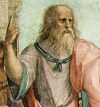- Cratylus (dialogue)
-

Part of the series on:
The Dialogues of PlatoEarly dialogues: Apology – Charmides – Crito Euthyphro – First Alcibiades Hippias Major – Hippias Minor Ion – Laches – Lysis Transitional & middle dialogues: Cratylus – Euthydemus – Gorgias Menexenus – Meno – Phaedo Protagoras – Symposium Later middle dialogues: Republic – Phaedrus Parmenides – Theaetetus Late dialogues: Clitophon – Timaeus – Critias Sophist – Statesman Philebus – Laws Of doubtful authenticity: Axiochus – Demodocus Epinomis – Epistles – Eryxias Halcyon – Hipparchus – Minos On Justice – On Virtue Rival Lovers – Second Alcibiades Sisyphus – Theages 
Part of a series on Plato Early life · Works · Platonism
Epistemology · Idealism / Realism
Theory of Forms
Form of the Good
Third man argument
Euthyphro dilemma · Five regimes
Philosopher kingAllegories and metaphors Ring of Gyges · The cave
The divided line · The sun
Ship of state · Myth of Er
The chariotRelated articles The Academy in Athens
Socratic problem
Commentaries on Plato
Middle Platonism · Neoplatonism
Neoplatonism and ChristianityCratylus (Ancient Greek: Κρατύλος, Kratulos) is the name of a dialogue by Plato. Most modern scholars agree that it was written mostly during Plato's so-called middle period.[1] In the dialogue, Socrates is asked by two men, Cratylus and Hermogenes, to tell them whether names are "conventional" or "natural", that is, whether language is a system of arbitrary signs or whether words have an intrinsic relation to the things they signify. In doing this, Cratylus became one of the earliest philosophical texts of the Classical Greek period to deal with matters of etymology and linguistics.
When discussing how a word would relate to its subject, Socrates compares the original creation of a word to the work of an artist. An artist uses color to express the essence of his subject in a painting. In much the same way, the creator of words uses letters containing certain sounds to express the essence of a word's subject. There is a letter that is best for soft things, one for liquid things, and so on. He comments, "This would be the most perfect state of language."
One countering position, held by Hermogenes, is that names have come about due to custom and convention. They do not express the essence of their subject, so they can be swapped with something unrelated by the individuals or communities who use them.
The line between the two perspectives is often blurred. During more than half of the dialogue, Socrates makes guesses at Hermogenes' request as to where names and words have come from. These include the names of the Olympian gods, personified deities, and many words that describe abstract concepts. He examines whether, for example, giving names of "streams" to Cronus and Rhea (Ροή – flow or space) are purely accidental.[2] Many of the words which Socrates uses as examples may have come from an idea originally linked to the name, but have changed over time. Those of which he cannot find a link, he often assumes have come from foreign origins or have changed so much as to lose all resemblance to the original word. He states, "names have been so twisted in all manner of ways, that I should not be surprised if the old language when compared with that now in use would appear to us to be a barbarous tongue."[3]
The final theory of relations between name and object named is posited by Cratylus, a disciple of Heraclitus, who believes that names arrive from divine origins, making them necessarily correct. Socrates rebukes this theory by reminding Cratylus of the imperfection of certain names in capturing the objects they seek to signify. From this point, Socrates ultimately rejects the study of language, believing it to be philosophically inferior to a study of things themselves.
Notes
- ^ pp. 6, 13-14, David Sedley, Plato's Cratylus, Cambridge U Press 2003.
- ^ Cratylus 402b
- ^ Cratylus 421d
External links
- Cratylus Greek text of the OCT edition by John Burnet (1903)
- Cratylus translated by Harold N. Fowler (1921)
- Bibliography on Plato's Cratylus (PDF)
Categories:- Dialogues of Plato
- Socratic dialogues
- History of linguistics
- Philosophy of language literature
Wikimedia Foundation. 2010.
